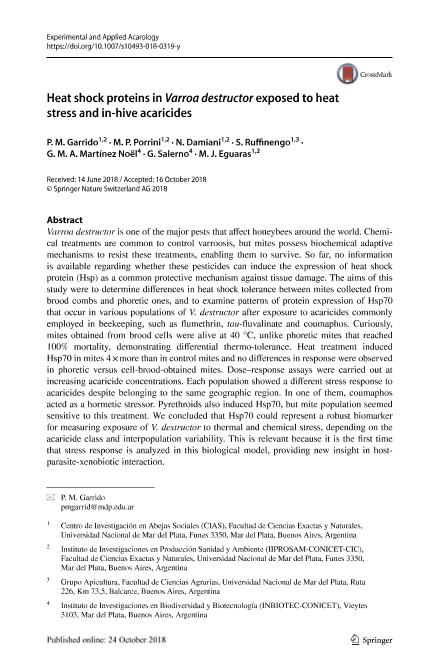Artículo
Heat shock proteins in Varroa destructor exposed to heat stress and in-hive acaricides
Garrido, Paula Melisa ; Porrini, Martín Pablo
; Porrini, Martín Pablo ; Damiani, Natalia
; Damiani, Natalia ; Ruffinengo, Sergio Roberto; Martínez Noël, Giselle María Astrid
; Ruffinengo, Sergio Roberto; Martínez Noël, Giselle María Astrid ; Salerno, Graciela Lidia
; Salerno, Graciela Lidia ; Eguaras, Martin Javier
; Eguaras, Martin Javier
 ; Porrini, Martín Pablo
; Porrini, Martín Pablo ; Damiani, Natalia
; Damiani, Natalia ; Ruffinengo, Sergio Roberto; Martínez Noël, Giselle María Astrid
; Ruffinengo, Sergio Roberto; Martínez Noël, Giselle María Astrid ; Salerno, Graciela Lidia
; Salerno, Graciela Lidia ; Eguaras, Martin Javier
; Eguaras, Martin Javier
Fecha de publicación:
12/2018
Editorial:
Springer
Revista:
Experimental and Applied Acarology
ISSN:
0168-8162
Idioma:
Inglés
Tipo de recurso:
Artículo publicado
Clasificación temática:
Resumen
Varroa destructor is one of the major pests that affect honeybees around the world. Chemical treatments are common to control varroosis, but mites possess biochemical adaptive mechanisms to resist these treatments, enabling them to survive. So far, no information is available regarding whether these pesticides can induce the expression of heat shock protein (Hsp) as a common protective mechanism against tissue damage. The aims of this study were to determine differences in heat shock tolerance between mites collected from brood combs and phoretic ones, and to examine patterns of protein expression of Hsp70 that occur in various populations of V. destructor after exposure to acaricides commonly employed in beekeeping, such as flumethrin, tau-fluvalinate and coumaphos. Curiously, mites obtained from brood cells were alive at 40 °C, unlike phoretic mites that reached 100% mortality, demonstrating differential thermo-tolerance. Heat treatment induced Hsp70 in mites 4 × more than in control mites and no differences in response were observed in phoretic versus cell-brood-obtained mites. Dose?response assays were carried out at increasing acaricide concentrations. Each population showed a different stress response to acaricides despite belonging to the same geographic region. In one of them, coumaphos acted as a hormetic stressor. Pyrethroids also induced Hsp70, but mite population seemed sensitive to this treatment. We concluded that Hsp70 could represent a robust biomarker for measuring exposure of V. destructor to thermal and chemical stress, depending on the acaricide class and interpopulation variability. This is relevant because it is the first time that stress response is analyzed in this biological model, providing new insight in host-parasite-xenobiotic interaction.
Palabras clave:
HEAT SHOCK
,
HSP70 EXPRESSION
,
SYNTHETIC ACARICIDES
,
VARROA DESTRUCTOR
Archivos asociados
Licencia
Identificadores
Colecciones
Articulos(CCT - MAR DEL PLATA)
Articulos de CTRO.CIENTIFICO TECNOL.CONICET - MAR DEL PLATA
Articulos de CTRO.CIENTIFICO TECNOL.CONICET - MAR DEL PLATA
Articulos(INBIOTEC)
Articulos de INSTITUTO DE INV. EN BIODIVERSIDAD Y BIOTECNOLOGIA
Articulos de INSTITUTO DE INV. EN BIODIVERSIDAD Y BIOTECNOLOGIA
Citación
Garrido, Paula Melisa; Porrini, Martín Pablo; Damiani, Natalia; Ruffinengo, Sergio Roberto; Martínez Noël, Giselle María Astrid; et al.; Heat shock proteins in Varroa destructor exposed to heat stress and in-hive acaricides; Springer; Experimental and Applied Acarology; 76; 4; 12-2018; 421-433
Compartir
Altmétricas



